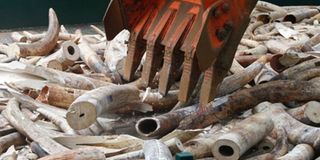Activists push govt to destroy 120 tonnes of ivory stockpile

What you need to know:
Prof Jumanne Maghembe in March 2016 said Tanzania would not destroy its ivory stockpile
Dodoma. Local conservation activists have challenged the government to publicly destroy the country’s ivory stockpile estimated to be 120 tonnes as part of a global campaign to rescue elephants from poaching.
Stakeholders from Usaid funded a campaign dubbed ‘Okoa Tembo wa Tanzania’ (Save Tanzanian Elephants) noted that, based on a global mood and experience on the anti-poaching war, the international community would not allow Tanzania to sell its stockpile.
Addressing journalists on Wednesday evening, campaign coordinator Subert Mwarabu said in 2008 the Convention on International Trade in Endangered Species (CITES) issued a permit for Zimbabwe, South Africa, Namibia and Botswana to sell 108 tonnes of ivory to markets in Japan and China.
“That last permit also benefited the growth of black market, which used the opportunity to siphon illegal tusks at slight cheaper prices,” said Mr Mwarabu adding: “You can see there is no way that Tanzania will be allowed to sell its stockpile because judging from the experience it may trigger the growth of illegal business.” Mwarabu also noted that, the remaining legally recognised international markets in East Asia had started closing and in the next five years Tanzania would have nowhere to sell its tusks.
As of 2010, the government noted that it was using $75,000 (about Sh167 million) to keep the stockpile in order. According to Mr Mwarabu, the government can inject the money into tourism promotion after setting the stock on fire.
The minister of Natural Resources and Tourism, Prof Jumanne Maghembe, in March 2016 said Tanzania would not destroy its ivory stockpile. Mwarabu explained that the campaign also pushed for the government to arrest and arraign kingpins in ivory trade and call on our Far East friends like China and Vietnam to clampdown on ivory black markets in their countries.
“We want the government to arrest and prosecute major ivory traders in our country regardless of their status. The government should use its bilateral friendship with China and Vietnam to convince them to end their domestic ivory trade,” said Mwarabu. Elephant census conducted by the Tanzania Wildlife Research Institute in 2015 places the number of elephants in the country at 50,443 down from 316,300 in 1979.




